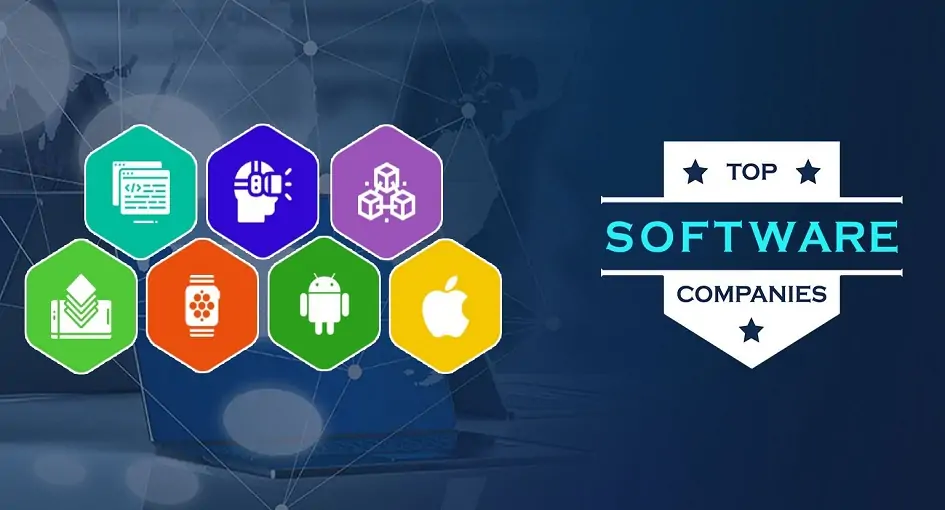
The Impact of Software Companies on Global Technology Markets
In an era defined by rapid technological advancement and digital transformation, software companies have emerged as pivotal agents of change, reshaping global technology markets and influencing every facet of modern life. From Silicon Valley giants to innovative startups across the globe, these companies are at the forefront of innovation, driving progress in industries ranging from healthcare and finance to entertainment and manufacturing.
The evolution of software companies mirrors the evolution of computing itself, from the early days of mainframes and personal computers to today’s interconnected ecosystems powered by cloud computing, artificial intelligence (AI), and the Internet of Things (IoT). This evolution has not only expanded the capabilities of software but has also fundamentally altered how businesses operate, how individuals interact, and how societies function.
At the heart of this technological revolution lies a diverse landscape of software firms, each contributing uniquely to the global marketplace. From enterprise software solutions that optimize business processes to consumer-facing applications that enhance everyday experiences, these companies drive innovation through their products, services, and platforms. They set technological standards, pioneer new business models, and lead industries into uncharted territories of possibility.
The influence of software firms extends far beyond technological innovation alone. They are economic powerhouses, contributing significantly to global GDP through job creation, investments in research and development, and revenue generation. Moreover, these companies play a crucial role in fostering entrepreneurship, supporting startups, and fueling economic growth in regions around the world.
In addition to their economic impact, software firms also wield cultural influence, shaping societal norms and behaviors through digital platforms, social media networks, and entertainment content. They are champions of sustainability, driving initiatives to reduce environmental footprints and promote responsible business practices. Furthermore, software companies navigate complex ethical considerations, from data privacy and cybersecurity to the ethical use of AI, ensuring that innovation is balanced with accountability and integrity.
The Rise of Software Companies
Software firms have emerged as pivotal players in the digital age, harnessing innovation to redefine industries and consumer experiences. The evolution of computing technologies, from mainframes to cloud computing and artificial intelligence (AI), has provided fertile ground for their growth. Today, a diverse array of companies spans the spectrum from enterprise solutions to consumer-facing applications, each contributing uniquely to technological advancement.
Top 20 Software Companies in the World
The top 20 software companies names in world are listed below.
1. Microsoft Corporation
2. Apple Inc.
3. Amazon.com Inc.
4. Alphabet Inc.
5. Facebook, Inc.
6. Oracle Corporation
7. SAP SE
8. Salesforce.com, Inc.
9. Adobe Inc
10. Intuit Inc.
11. VMware, Inc
12. Cisco Systems, Inc.
13. IBM Corporation
14. ServiceNow, Inc.
15. NVIDIA Corporation
16. Netflix, Inc.
17. Square, Inc.
18. Uber Technologies, Inc.
19. Dropbox, Inc.
20. Twitter, Inc.
Impact on Global Technology Markets
Software firms wield significant influence across several dimensions of the global technology landscape:
1. Innovation and Disruption:
Through continuous innovation, software firms drive technological disruption across industries, fostering new business models and enhancing productivity.
2. Economic Contribution:
They contribute substantially to global economies through job creation, investments in research and development, and revenue generation, often serving as economic anchors in their respective regions.
3. Market Expansion:
By expanding access to digital tools and services, software firms empower businesses of all sizes to compete in the global marketplace, thereby fueling economic growth and globalization.
4. Technological Leadership:
Leading software firms set technological standards and trends, shaping the direction of future innovations such as AI, blockchain, and cybersecurity solutions.
Regional Insights: Software Companies in USA
The United States remains a powerhouse in the software industry, home to a significant number of the world’s top software companies. Silicon Valley in California stands out as a global hub for technological innovation, attracting talent and investment from around the world. Companies like Microsoft, Apple, and Alphabet exemplify American dominance in software development, influencing both domestic and international markets.
Strategic Partnerships and Mergers
Software firms often engage in strategic partnerships and mergers to enhance their capabilities and market reach. Collaborations between tech giants, such as Microsoft’s acquisition of LinkedIn and GitHub, illustrate strategic moves to integrate diverse technologies and expand their service offerings globally.
Impact on Digital Transformation
Software firms drive digital transformation across industries by providing essential tools and platforms that enable businesses to streamline operations, improve customer experiences, and adapt to rapidly changing market demands. This transformation is particularly evident in sectors like finance, healthcare, and manufacturing, where software solutions optimize processes and drive innovation.
Role in Sustainability Initiatives
Leading software firms are increasingly integrating sustainability practices into their operations and product offerings. Initiatives include developing energy-efficient data centers, promoting remote work solutions to reduce carbon footprints, and incorporating eco-friendly practices into software development processes. These efforts not only align with global sustainability goals but also enhance corporate reputations and attract environmentally conscious consumers.
Influence on Education and Skill Development
It plays a crucial role in shaping education and skill development through initiatives like coding academies, online learning platforms, and partnerships with educational institutions. By promoting digital literacy and offering training programs in emerging technologies, they contribute to a skilled workforce capable of driving future innovation and economic growth.
Ethical Considerations in AI and Data Privacy
As software firms harness the power of AI and big data analytics, ethical considerations around data privacy, algorithmic bias, and transparency become increasingly critical. Companies are investing in robust ethical frameworks, collaborating with regulators, and engaging in public discourse to address these challenges responsibly and build trust among users and stakeholders.
Impact on Startups and Entrepreneurship
Software company names play a dual role in both fostering and competing with startups and small enterprises. While large companies dominate certain segments, they also provide platforms and ecosystems that enable startups to innovate and scale rapidly. Initiatives like accelerator programs, venture funding, and open-source collaborations contribute to a vibrant startup ecosystem that drives innovation and economic dynamism.
Cultural Influence and Global Reach
It not only shapes technology but also influences global culture through its products and services. Platforms like social media networks, streaming services, and gaming platforms have become integral parts of daily life, connecting people across borders and contributing to cultural exchange and globalization.
FAQs
What are top 10 IT companies?
The top 10 software companies in world include Microsoft, Apple, Amazon, Alphabet, Facebook, Samsung, Cisco, Intel, IBM, and Oracle, leading in software development, hardware manufacturing, cloud computing, and digital services.
What is the most popular software company?
Microsoft, renowned for its Windows operating system, Office suite, and Azure cloud computing services, has significantly influenced global technology markets through widespread adoption in various industries.
What are the 9 tech companies?
Big Tech companies, including Apple, Amazon, Microsoft, Google, Facebook, Netflix, IBM, Intel, and Cisco, significantly influence global technology markets across hardware, software, cloud computing, e-commerce, social media, entertainment, and enterprise solutions.
What are the top 5 biggest tech companies?
The top 5 software companies in world are Microsoft, Apple, Amazon, Alphabet, and Facebook, renowned for their innovative software, hardware, cloud computing, e-commerce, and digital advertising.
Who is the richest tech company?
Microsoft is the world’s richest tech company, surpassing Apple and Amazon, due to its diversified portfolio, including cloud computing, software services, and enterprise solutions.
Innovations in User Experience and Interface Design
User experience (UX) and interface design are critical areas where software companies innovate to enhance usability and accessibility. Innovations such as intuitive interfaces, voice recognition, and augmented reality (AR) interfaces redefine how users interact with technology, improving engagement and satisfaction across diverse demographics.
Contributions to Open Source Communities
Many software firms contribute to open-source projects and communities, fostering collaboration and accelerating innovation in software development. By sharing code, tools, and resources, these companies democratize access to technology and empower developers worldwide to build upon existing frameworks and drive collective progress.
Role in Healthcare and Biotechnology
Software firms are increasingly leveraging technology to revolutionize healthcare and biotechnology. Innovations in electronic health records (EHRs), telemedicine platforms, and AI-driven diagnostics improve patient care, streamline healthcare delivery, and advance medical research. These technologies have proven critical during global health crises, demonstrating the potential of software firms to support public health initiatives and improve healthcare outcomes globally.
Software Companies Impact on Government and Public Services
Software firms collaborate with governments to modernize public services, enhance administrative efficiency, and foster citizen engagement. Initiatives include smart city solutions, digital governance platforms, and cybersecurity frameworks that protect critical infrastructure and ensure secure digital transactions. These partnerships facilitate economic growth, improve public safety, and promote sustainable urban development.
Impact on Supply Chain and Logistics
It plays a crucial role in optimizing supply chain management and logistics through advanced analytics, predictive modeling, and IoT integration. Technologies such as blockchain facilitate transparency and traceability in supply chains, reducing inefficiencies, minimizing risks, and enhancing overall operational resilience.
Influence on Entertainment and Media
Software firms are transforming the entertainment and media landscape with digital streaming platforms, interactive content, and personalized recommendations. These innovations cater to evolving consumer preferences, drive subscription-based models, and redefine how content is created, distributed, and consumed globally.
Collaboration with Academia and Research Institutions
Software firms collaborate with academia and research institutions to advance scientific discovery, technological breakthroughs, and academic research. Partnerships involve funding research projects, providing access to computing resources, and supporting initiatives in fields like AI, machine learning, and cybersecurity.
Software Companies: Role in Environmental Sustainability
Leading software firms are committed to sustainability practices, including carbon neutrality pledges, renewable energy investments, and eco-friendly product design. By reducing environmental footprints and promoting green technologies, these companies contribute to global efforts to mitigate climate change and build a sustainable future.
Impact on Economic Empowerment and Digital Inclusion
Software firms promote economic empowerment and digital inclusion by expanding access to digital tools, internet connectivity, and educational resources in underserved communities. Initiatives focus on bridging the digital divide, empowering entrepreneurs, and fostering economic opportunities through technology-enabled solutions.
Cybersecurity Leadership and Data Protection
Software firms are at the forefront of cybersecurity innovation, developing robust solutions to protect data privacy and mitigate cyber threats. Advances in encryption, threat detection, and security protocols safeguard digital assets, bolster consumer trust, and ensure compliance with regulatory standards such as GDPR and CCPA.
Innovation in Financial Technology (Fintech)
Top software companies in world are driving innovation in fintech, revolutionizing financial services through digital banking, payment solutions, blockchain applications, and robo-advisors. These innovations democratize access to financial services, enhance transaction efficiency, and foster financial inclusion for individuals and businesses globally.
Adaptive Technologies for Disability Inclusion
Software firms develop adaptive technologies, such as assistive devices and accessibility features, to empower individuals with disabilities. These technologies enhance digital accessibility, promote workplace inclusivity, and improve quality of life by enabling equal participation in education, employment, and social activities.
Influence on Smart Manufacturing and Industry 4.0
Software firms enable smart manufacturing and Industry 4.0 initiatives through IoT integration, AI-driven predictive maintenance, and digital twins. These technologies optimize production processes, minimize downtime, and facilitate real-time decision-making, driving operational efficiency and innovation across manufacturing sectors worldwide.
Social Responsibility and Corporate Philanthropy
Leading software firms prioritize social responsibility and corporate philanthropy, investing in community initiatives, education programs, and humanitarian aid. These efforts support sustainable development goals, address social inequalities, and contribute to the well-being of global communities through charitable contributions and volunteerism.
Integration of Artificial Intelligence and Machine Learning
Companies are leveraging AI and machine learning to enhance automation, predictive analytics, and personalized user experiences. Applications span from virtual assistants and chatbots to sophisticated algorithms powering recommendation systems and autonomous vehicles, driving efficiency and innovation across industries.
Impact on E-commerce and Digital Marketing
It plays a pivotal role in e-commerce and digital marketing by providing platforms for online retail, customer relationship management (CRM), and digital advertising. Technologies such as big data analytics and AI-driven marketing solutions optimize marketing campaigns, improve customer targeting, and maximize return on investment (ROI) for businesses worldwide.
Role in Crisis Management and Resilience
Software firms contribute to crisis management and resilience through disaster response technologies, emergency communication systems, and risk assessment tools. These solutions support governments, organizations, and communities in preparing for and responding to natural disasters, public health emergencies, and cybersecurity incidents.
Advancements in Virtual Reality (VR) and Augmented Reality (AR)
Software companies list innovating in VR and AR technologies, transforming entertainment, education, healthcare, and industrial training. Immersive experiences enable virtual simulations, remote collaboration, and interactive learning environments, pushing the boundaries of digital interaction and enhancing user engagement.
Evolution of Cloud Computing and Edge Computing
Software firms drive the evolution of cloud computing and edge computing architectures, enabling scalable infrastructure, real-time data processing, and decentralized computing capabilities. These technologies empower businesses to deploy applications more efficiently, enhance scalability, and optimize resource allocation in a dynamically changing digital landscape.
Challenges and Opportunities
While software firms drive immense progress, they also face challenges such as regulatory scrutiny, cybersecurity threats, and the need for ethical considerations in AI and data privacy. However, these challenges also present opportunities for further innovation and collaboration within the industry.
Software Companies Future Outlook
Looking ahead, software firms are poised to continue shaping the global technology landscape through advancements in cloud computing, AI-driven solutions, and the Internet of Things (IoT). As they navigate an increasingly complex environment, their ability to innovate responsibly and adapt to evolving market dynamics will be crucial.




